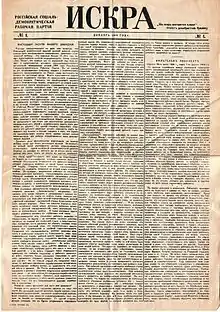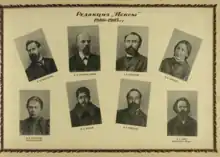| "Из искры возгорится пламя" ("From a spark a flame will flare up") | |
 The first issue of Iskra | |
| Founder(s) |
|
|---|---|
| Staff writers |
|
| Founded | 1900 |
| Political alignment | Russian Social Democratic Labour Party |
| Language | Russian |
| Ceased publication | 1905 |
| Circulation | 8,000 |
Iskra (Russian: Искра, IPA: [ˈiskrə], the Spark) was a political newspaper of Russian socialist emigrants established as the official organ of the Russian Social Democratic Labour Party (RSDLP).
History
.jpg.webp)
Iskra was published in exile and then smuggled into Russia.[1] Initially, it was managed by Vladimir Lenin, moving as he moved. The first edition was published in Leipzig,[2] Germany, on December 1, 1900 (other sources say Dec. 11). Other editions were published in Munich (1900–1902) and Geneva from 1903. When Lenin was in London (1902–1903) the newspaper was edited from a small office at 37a Clerkenwell Green, EC1,[3] with Henry Quelch arranging the necessary printworks.[4]
Iskra quickly became the most successful underground Russian newspaper in 50 years.[5]
In 1903, following the split of the RSDLP, Chairman Georgi Plekhanov chose to seek reconciliation with dissident party members who had walked out on the vote to reduce the number of seats on the editorial board from six to three. The motion had passed with 25 votes, 17 abstaining. Regardless of these results, Plekhanov pursued his new aims of reconciliation. He chose to nominate three members, all Mensheviks whom had been formally rejected by the party congress prior, to the editorial board. Lenin resigned shortly before the nominations were finalized, leaving Iskra firmly in Menshevik hands.[6]
Political viewpoint
Iskra's motto was "Из искры возгорится пламя" (Iz iskry vozgoritsya plamya — "From a spark a flame will flare up") — a line from the reply Alexander Odoevsky wrote to the poem by Alexander Pushkin addressed to the anti-tsar Decembrists imprisoned in Siberia. The editorial line championed the battle for political freedom as well as the cause of socialist revolution.[1] The paper also ran a number of notable polemics against "economists", who argued against political struggle in favour of pure trade-union activity for the worker's economic interests, as well as the Socialist Revolutionaries, who advocated terror tactics.[7] In the book What Is to Be Done?, Lenin argues that trade-union activity, although being a good starting point for revolution, would only stay at the level of trade-unionist politics and wouldn't be capable, in itself, to challenge the aristocracy or capitalism. Lenin, on the other hand, argues for a vanguard party, made up of professional revolutionaries, to lead the political struggle and raise the average worker to the level of revolutionaries.[8]
As outlined by Lenin in What Is to Be Done?, Iskra took the place of a central project to cohere the RSDLP nationally.[1]
Staff

Initial staff members:
- Vladimir Lenin (Vladimir Ilyich Ulyanov)
- Dmitri Ilyich Ulyanov, his younger brother
- Georgi Plekhanov
- Vera Zasulich
- Pavel Axelrod (Pinchas Borutsch)
- Julius Martov (Ilija Cederbaum)
- Aleksandr Potresov
Later:
- Leon Trotsky (Lev Davidovich Bronstein)
Some of the staff were later involved in the Bolshevik revolution of October 1917.
Blumenfeld did the printing. Leo Deutsch was the administrator of Iskra but did not share in the editorial work.[9]
Savva Morozov was one of the people who financed the paper.
See also
Footnotes
- 1 2 3 Lih, Lars (2005). Lenin Rediscovered: What is to be Done? in Context. Brill Academic Publishers. ISBN 978-90-04-13120-0.
- ↑ Helen Rappaport (2012). Conspirator: Lenin in Exile. New York: Basic Books. p. 35. ISBN 978-0-465-02859-7.
- ↑ Glancey, Jonathan. G2: Architecture, The Guardian, 21 June 2004
- ↑ John Saville, "Quelch, Henry [Harry] (1858–1913)", rev. Oxford Dictionary of National Biography, Oxford University Press, 2004.
- ↑ Rice, Christopher (1990). Lenin: Portrait of a Professional Revolutionary. London: Cassell. ISBN 978-0-304-31814-8.
- ↑ Carr, Edward Hallett (January 17, 1985). The Bolshevik Revolution, 1917-1923 Vol. 1 (1st ed.). W. W. Norton & Company. p. 31. ISBN 978-0393301953.
- ↑ Miliukov, Paul (1962). Russia and its Crisis. Collier-Macmillan Ltd. pp. 353–4.
- ↑ Lenin, Vladimir (1905). What is to be done? Burning Questions of Our Movement. Wellred. p. 230. ISBN 1900007924.
- ↑ Lenin and the Old Iskra; Part II in Lenin, (1925) by Leon Trotsky
Further reading
- Allan K. Wildman, "Lenin's Battle with Kustarnichestvo: The Iskra Organization in Russia," Slavic Review, vol. 23, no. 3 (Sept. 1964), pp. 479–503. In JSTOR.